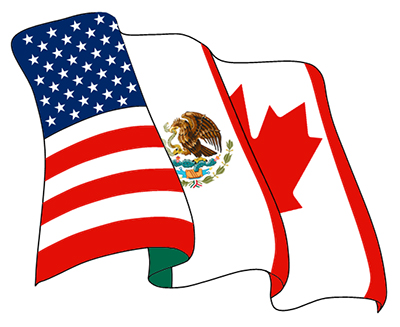
As possible, new trade agreements stir debate on the world stage, a North American citizen advisory panel is urging that a new emphasis be placed on the ecological costs of increased trade and money flows.
In a statement issued shortly before Christmas, the Joint Public Advisory Committee (JPAC), a trinational group consisting of representatives from the three member nations of the North American Free Trade Agreement (NAFTA), called on the leaders of Canada, the United States and Mexico to demonstrate a “revival of political will” and undertake a “new mission” with enhanced public involvement in trade and environmental matters.
The 15-member JPAC is affiliated with the Montreal-based Commission for Environmental Cooperation (CEC), which serves as the environmental watchdog agency established under NAFTA’s environmental side agreement.
In its statement, the JPAC cited eight specific areas deserving new or renewed attention: climate change, transportation and energy, water, biodiversity, investment and subsidies, cumulative and transboundary environmental impacts, focused trade and environmental issues, and the North American ecological footprint on the world.
The JPAC’s recommendations followed a public input process held to review the impacts of NAFTA two decades after the trade pact was launched. As part of the process, the JPAC received 66 written comments and hosted a public meeting held October 17-18 in Washington, D.C.
Based on the evidence, the JPAC concluded that a feared “race to the bottom” in environmental standards did not occur under NAFTA, but that environmental challenges have changed and grown more urgent in the massive trade zone.
“Moreover, the three governments have made very little progress in addressing concerns regarding the aggregate scale of environmental footprints and impacts as the North American economy has grown,” the JPAC stated. “Thus, as integration of the region deepens, so should the CEC’s mandate. The CEC needs new goals and tasks, targeted to the priorities of the next twenty years…”
The citizen advisors from the three NAFTA nations credited the CEC for accomplishments during the last 20 years, including the elimination of the chemical pesticide DDT and the establishment of a national pollutant registry in Mexico.
An important part of the CEC’s work is investigating citizen complaints of alleged environmental law violations in the NAFTA states. Although the CEC’s staff prepares a factual record of the issues surrounding the complaint, the agency does not have the power to fine or levy other sanctions.
In the JPAC’s analysis, the CEC requires budgetary muscle. According to the panel, funding for the agency has stagnated even as trade continues to boom.
Consequently, the JPAC proposes increasing the CEC’S annual budget to at least $9 million for 2014, with subsequent increases to the $14-15 million range in order to bring financial support for the work of the environmental institution to its “original level in real terms.”
To put the budgetary numbers in perspective, the Otay Mesa Port of Entry in California alone registered $34.5 billion in cross-border trade in 2012, according to the local chamber of commerce.
While acknowledging criticisms of the CEC, the JPAC called for “meaningful engagement” and more consultations between the tri-national agency and academia, industry, local governments and indigenous communities.
The JPAC maintains that the CEC’s experience with NAFTA renders the agency a valuable player capable of advising and strengthening other pending trade agreements like the Trans Pacific Partnership.
Readers interested in the complete JPAC statement, as well as the 66 written comments received on NAFTA and the environment, can go the following links:
http://www.cec.org/Storage/156/18241_JPAC_Advice_13-04-Final_en.pdf
http://cec.org/Page.asp?PageID=924&ContentID=25632&AA_SiteLanguageID=1



Responses to “Reviewing NAFTA and the Environment”